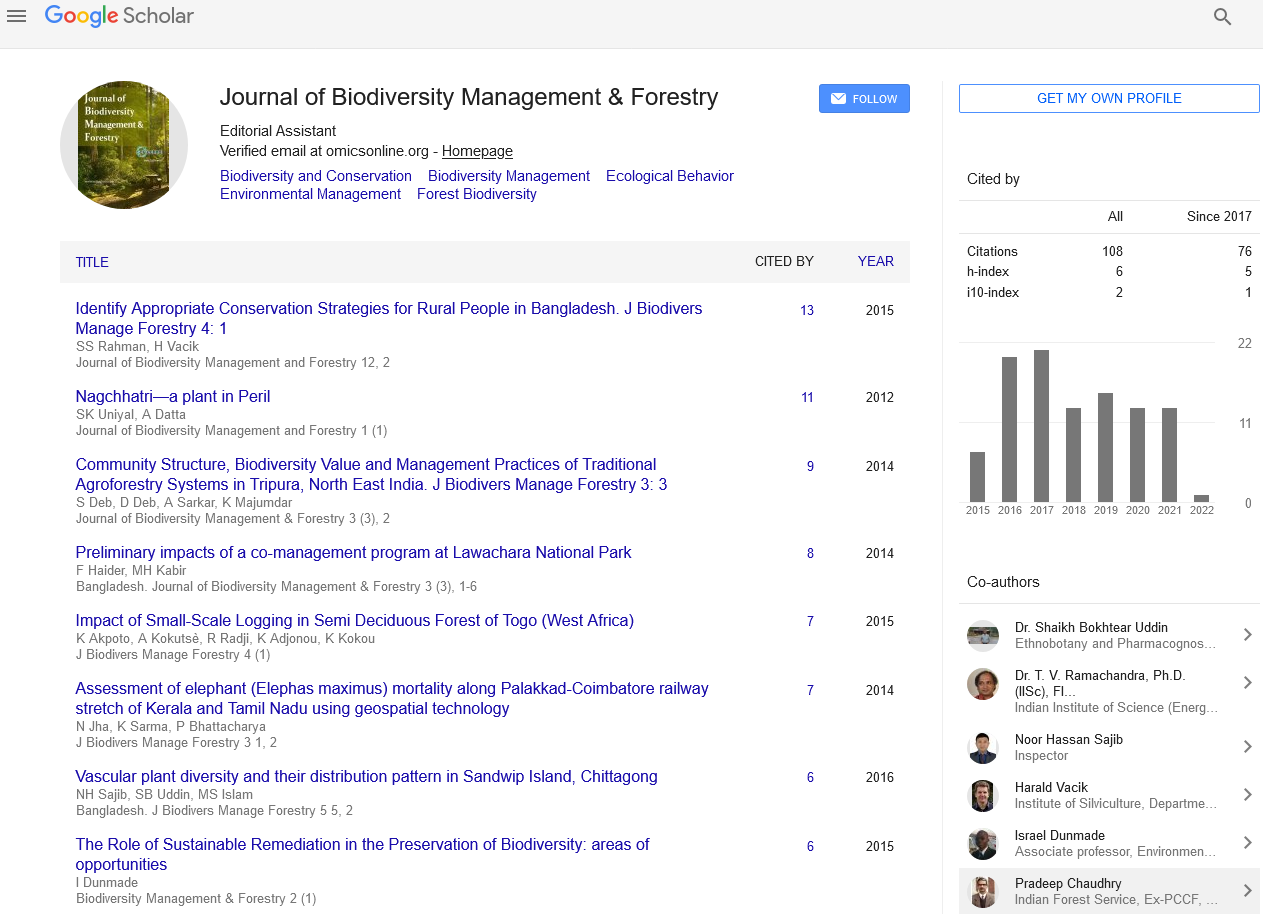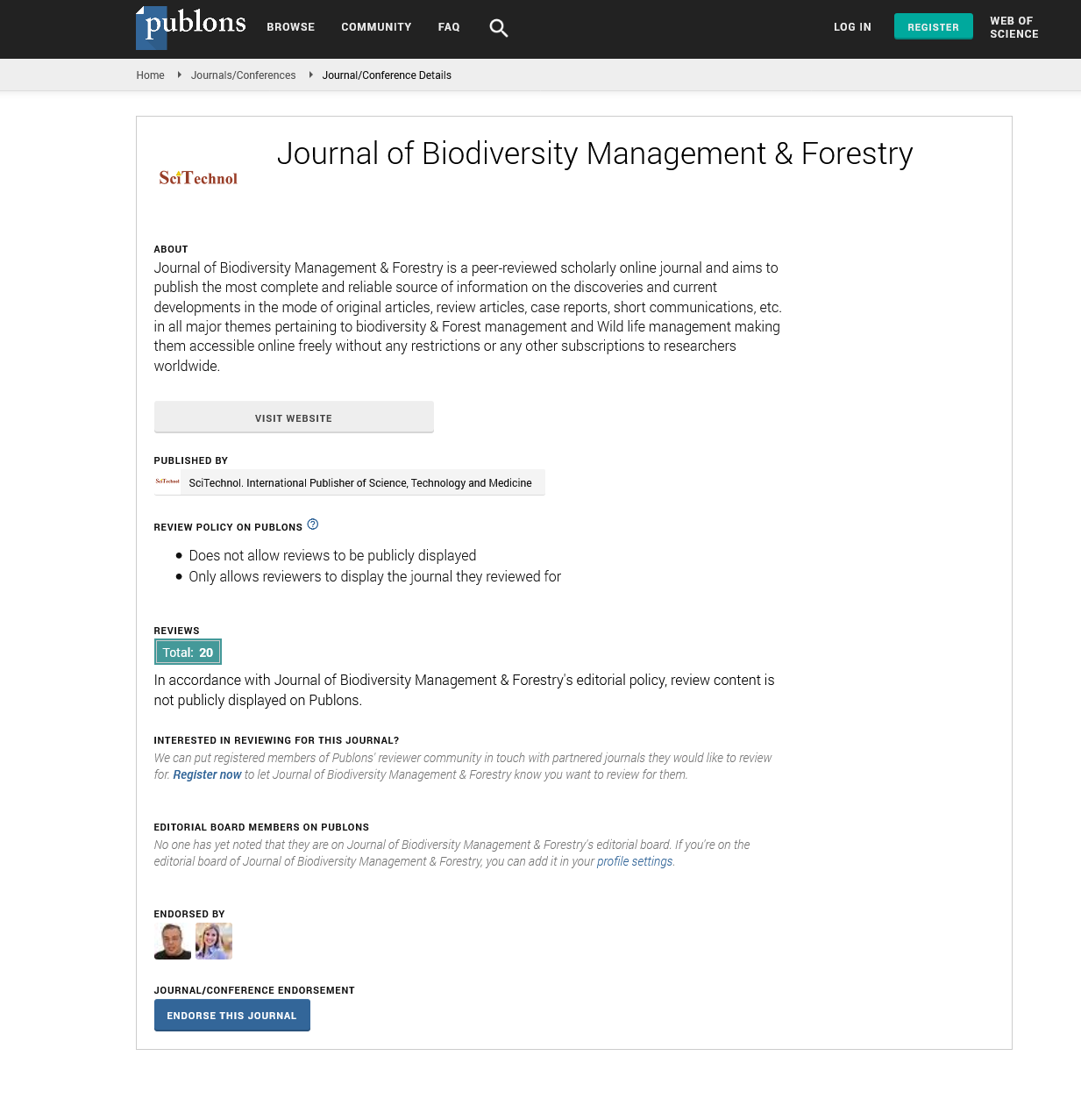Opinion Article, J Biodivers Manage Forestry Vol: 12 Issue: 2
Fostering Collaboration between Indigenous Communities and Conservation Efforts
Yvan Riley*
1Department of Biomedical Informatics and Medical Education, School of Medicine, University of Washington, Seattle, USA
*Corresponding Author: Yvan Riley
Department of Biomedical Informatics and
Medical Education, School of Medicine, University of Washington, Seattle, USA
E-mail: riley.yv@sm.edu
Received date: 27 March, 2023, Manuscript No. JBMF-23-98631;
Editor assigned date: 30 March, 2023, Pre QC No. JBMF-23-98631(PQ);
Reviewed date: 14 April, 2023, QC No. JBMF-23-98631;
Revised date: 22 April, 2023, Manuscript No. JBMF-23-98631(R);
Published date: 28 April, 2023, DOI: 10.4172/jbmf 2327-4417.10031
Citation: Riley Y (2023) Fostering Collaboration between Indigenous Communities and Conservation Efforts. J Biodivers Manage Forestry 12:2.
Abstract
Description
Indigenous knowledge encompasses the collective wisdom, practices, and beliefs developed by indigenous communities over generations. It is deeply rooted in their relationship with nature and has proven to be a valuable resource for biodiversity management. This will discuss the significance of indigenous knowledge systems in understanding and conserving biodiversity. By recognizing the importance of indigenous knowledge, we can enhance conservation efforts and foster sustainable practices that benefit both ecosystems and indigenous communities.
Indigenous knowledge systems, often referred to as Traditional Ecological Knowledge (TEK), are embedded in indigenous cultures and intimately tied to the natural environment. TEK reflects the accumulated wisdom gained through long-term observations, experiential learning, and intergenerational transmission. It encompasses a holistic understanding of ecosystems, including their dynamics, species interactions, and ecological processes.
Indigenous communities have traditionally practiced sustainable land and resource management, which promotes the maintenance of biodiversity. Their knowledge systems offer valuable insights into species identification, ecological relationships, and local biodiversity patterns. By intimately understanding their surroundings, indigenous peoples have developed sophisticated strategies to interact harmoniously with nature.
Indigenous knowledge contributes to biodiversity conservation in several ways. First, it offers a comprehensive understanding of ecosystems, including the behavior and ecological requirements of different species. Indigenous peoples possess detailed knowledge of local flora and fauna, their medicinal properties, and their ecological roles. This information is important for effective conservation and restoration efforts.
Second, indigenous knowledge provides insights into the sustainable use of natural resources. Indigenous communities have developed practices such as rotational farming, selective harvesting, and traditional fishing methods that allow for resource extraction while ensuring the long-term viability of ecosystems. These practices help prevent overexploitation and promote the conservation of biodiversity.
Third, indigenous knowledge systems emphasize the interconnectedness of all living beings. Indigenous communities perceive themselves as integral parts of the natural world, with reciprocal responsibilities towards the environment. This worldview promotes a sense of stewardship and fosters sustainable practices that prioritize the well-being of ecosystems and their biodiversity.
Furthermore, indigenous knowledge systems are adaptive and responsive to environmental changes. Through centuries of close interaction with their environments, indigenous communities have developed a deep understanding of ecosystem resilience and adaptation. This knowledge can inform conservation strategies in the face of climate change, habitat loss, and other challenges. Indigenous communities often possess valuable insights into how ecosystems can withstand and recover from disturbances, which can guide conservation efforts towards more effective and sustainable solutions.
However, the role of indigenous knowledge in biodiversity management is not without challenges. Indigenous communities have historically faced marginalization, land dispossession, and cultural erosion, leading to the loss of traditional knowledge. It is important to recognize and respect indigenous rights, promote their active participation in decision-making processes, and ensure equitable sharing of benefits arising from biodiversity conservation efforts. Collaborative partnerships between indigenous communities, scientists, policymakers, and conservation organizations are essential to leverage indigenous knowledge for effective biodiversity management.
Indigenous knowledge systems hold significant potential for biodiversity management. By integrating traditional ecological knowledge with scientific approaches, we can develop comprehensive strategies that enhance conservation efforts, promote sustainable practices, and respect indigenous rights. Recognizing the role of indigenous knowledge in biodiversity management not only contributes to the preservation of ecosystems and species but also acknowledges the invaluable wisdom and cultural heritage of indigenous communities. Embracing this knowledge offers a pathway towards a more inclusive, equitable, and effective approach to biodiversity conservation.
 Spanish
Spanish  Chinese
Chinese  Russian
Russian  German
German  French
French  Japanese
Japanese  Portuguese
Portuguese  Hindi
Hindi 
